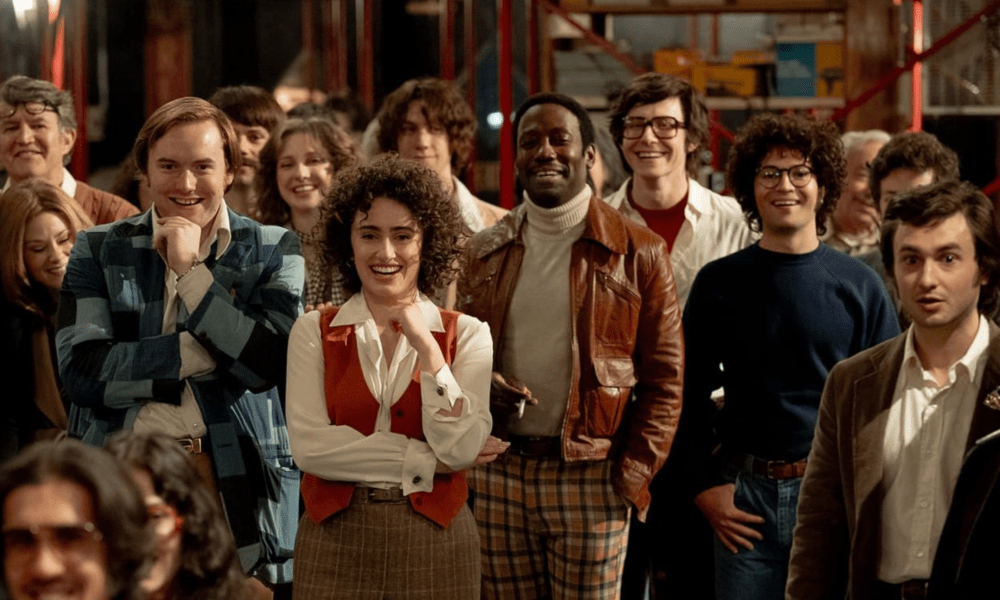Jason Reitman’s Saturday Night is a biographical comedy-drama chronicling the tense, chaotic evening leading up to the 1975 premiere of NBC’s Saturday Night—the show that would later become the cultural juggernaut Saturday Night Live (SNL). Boasting an ensemble cast led by Gabriel LaBelle as the young, determined Lorne Michaels, the film aspires to paint an intimate portrait of one of television’s most transformative moments. Unfortunately, while the premise holds immense promise, the execution falls flat, resulting in a muddled, underwhelming portrayal of a night brimming with creative and personal conflicts.
Structure:
The film’s structure mirrors the fragmented nature of that fateful night, with various subplots vying for attention. Each cast and crew member wrestles with their own insecurities and challenges: Garrett Morris grapples with being an outlier in a cast of white comedians, John Belushi exudes chaotic energy as he isolates himself from his peers, and the writers spar with the network censors over creative freedom.
While these storylines provide opportunities for character exploration, Reitman struggles to balance them effectively. The narrative frequently jumps between characters, often abandoning plot threads just as they begin to gain traction. This scattershot approach sacrifices depth for breadth, leaving most characters feeling underdeveloped and their arcs unresolved. The result is a film that feels more like a series of disconnected vignettes than a cohesive story.
Performances:
Gabriel LaBelle delivers a solid performance as Lorne Michaels, capturing the young producer’s determination and quiet frustration as he navigates the challenges of mounting a live sketch comedy show. However, the script fails to delve deeply into Michaels’s psyche, rendering him more of a reactive figure than a driving force in the narrative.
The supporting cast fares worse, with many iconic figures from SNL’s early days reduced to caricatures. Cory Michael Smith’s Chevy Chase is arrogant and abrasive, but the performance lacks nuance, making it difficult to see the comedic brilliance beneath the bravado. Similarly, Dylan O’Brien’s Dan Aykroyd is relegated to the background, offering little insight into one of SNL’s most creative minds. Ella Hunt’s Gilda Radner is a rare bright spot, bringing warmth and humor to her portrayal, but her limited screen time prevents her from leaving a lasting impression.
It’s not a funny movie:
Given its subject matter, Saturday Night should have been a riotous blend of comedy and drama, capturing the spirit of the groundbreaking show it depicts. Instead, the humor feels forced and uninspired, relying too heavily on broad stereotypes and recycled gags. Moments of levity are few and far between, and the comedic potential of the ensemble cast is largely squandered.
The film also struggles to convey the emotional stakes of the story. While the tension of the impending live broadcast is palpable, the personal connections between characters feel shallow and perfunctory. There’s a missed opportunity to explore the camaraderie and conflicts that defined the early days of SNL, which could have added depth and resonance to the film.
Direction and production design:
Reitman’s direction, typically sharp and character-driven, feels uncharacteristically restrained here. The film’s pacing is uneven, with some scenes dragging while others rush through critical moments. The chaotic energy of the night is conveyed through quick cuts and overlapping dialogue, but these techniques often come across as disorienting rather than immersive.
The production design, while competent, lacks the authenticity and detail needed to transport viewers to 1975. The NBC studios feel more like a generic television set than a living, breathing environment, and the period-specific details are often superficial. These shortcomings undermine the film’s ability to capture the era and the unique atmosphere of SNL’s inception.
Anti-climactic:
Perhaps the film’s biggest failing is its inability to convey the cultural and historical significance of the night it portrays. Saturday Night had the potential to be a love letter to the audacious, irreverent spirit of SNL, celebrating the risks and creativity that made the show a cultural touchstone. Instead, it feels more like a footnote than a tribute, offering little insight into what made the show revolutionary or why it continues to resonate with audiences decades later.
Even the climactic moment lacks the emotional weight and triumph one would expect. The film’s attempt to build tension leading up to this moment is undercut by its inconsistent tone and lack of character investment, leaving the audience feeling more relieved than inspired.
Overall:
Jason Reitman’s Saturday Night is a well-intentioned but ultimately disappointing attempt to dramatize one of television’s most iconic moments. Despite a talented cast and a fascinating premise, the film is hampered by an unfocused narrative, underdeveloped characters, and a failure to capture the humor and heart of its subject matter.
While fans of SNL may find some enjoyment in spotting references and Easter eggs, the film offers little to those unfamiliar with the show’s history. For a story about a night that changed television forever, Saturday Night fails to live up to its potential, delivering a lukewarm homage to a groundbreaking legacy.
-
Acting - 7/10
7/10
-
Cinematography/Visual Effects - 6/10
6/10
-
Plot/Screenplay - 5/10
5/10
-
Setting/Theme - 5/10
5/10
-
Watchability - 5/10
5/10
-
Rewatchability - 1/10
1/10













